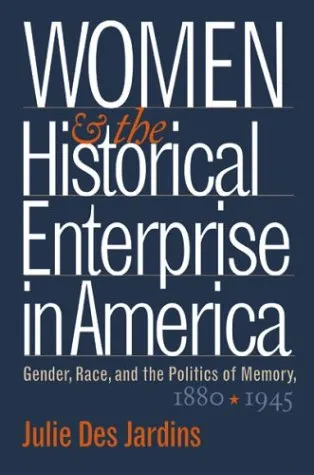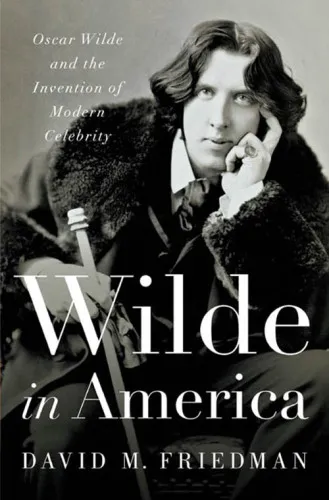Women and the Historical Enterprise in America: Gender, Race, and the Politics of Memory, 1880-1945
4.5
بر اساس نظر کاربران

شما میتونید سوالاتتون در باره کتاب رو از هوش مصنوعیش بعد از ورود بپرسید
هر دانلود یا پرسش از هوش مصنوعی 2 امتیاز لازم دارد، برای بدست آوردن امتیاز رایگان، به صفحه ی راهنمای امتیازات سر بزنید و یک سری کار ارزشمند انجام بدینکتاب های مرتبط:
خلاصه تحلیلی کتاب
این کتاب، پژوهشی جامع درباره نقش زنان در شکلگیری و پیشبرد تاریخنگاری در ایالات متحده، از اواخر قرن نوزدهم تا اواسط قرن بیستم است. نویسنده با بررسی آرشیوها، آثار منتشر شده و فعالیتهای سازمانی، نشان میدهد که چگونه جنسیت و نژاد بهعنوان عوامل تعیینکننده، مسیر توسعه تاریخنگاری و سیاستهای حافظه را تحت تأثیر قرار دادهاند.
در این اثر، به جای روایت خطی از رویدادهای تاریخی، تحلیلهای چندلایهای ارائه میشود که ارتباط پیچیده زنان تاریخنگار با نهادهای علمی، انجمنهای تاریخی و فضای اجتماعی زمان خود را بازتاب میدهد. نویسنده تاکید دارد که بدون در نظر گرفتن ابعاد جنسیت و نژاد، فهم کامل از روند شکلگیری حافظه جمعی ممکن نیست.
نکات کلیدی و کاربردی
یکی از نکات برجسته کتاب، ارائه شواهد متقاطع از نقش زنان در اصلاح معیارهای اعتبار علمی در تاریخنگاری است. این رویکرد، به پژوهشگران امروز کمک میکند تا جایگاه جنسیت را نه صرفاً بهعنوان یک موضوع جانبی، بلکه به عنوان بخشی اصلی از مصالح حافظه تاریخی ببینند.
کتاب همچنین نشان میدهد که چگونه سیاستهای حافظه در آمریکا، نه تنها تحت تأثیر ساختارهای قدرت رسمی بلکه در نتیجه فعالیتهای میدانی و آرشیوی زنان، بازتعریف شدهاند. این تحلیلها برای پژوهشهای میانرشتهای در حوزه Memory Studies نیز الهامبخش هستند.
نقلقولهای ماندگار
کتاب سرشار از گزارههایی است که به تفکر نقادانه درباره سازوکار حافظه جمعی و جایگاه زنان در تاریخنگاری آمریکا دامن میزند. این جملات، نه تنها ارزش پژوهشی دارند بلکه کاربرد آموزشی و الهامبخشی نیز یافتهاند.
نقش زنان در تاریخنگاری آمریکا، نه حاشیهای بلکه قلب تپنده حافظه جمعی است. نامشخص
سیاستهای حافظه را نمیتوان بدون درک تقاطع جنسیت، نژاد و قدرت فهمید. نامشخص
چرا این کتاب اهمیت دارد
اهمیت این کتاب در ترکیب ظریف میان پژوهش آرشیوی و تحلیل انتقادی نهفته است. بسیاری از آثار موجود، بهطور مجزا به جنسیت یا نژاد پرداختهاند؛ اما این کتاب هر دو را بهمثابه مؤلفههایی درهمتنیده بررسی میکند. چنین رویکردی، تصویر جامعتری از ساختار قدرت و چگونگی شکلگیری حافظه تاریخی ارائه میدهد.
برای پژوهشگران جدی رشتههای تاریخ، جامعهشناسی و مطالعات فرهنگی، این اثر فرصتی فراهم میکند تا ابزار تحلیلی جدیدی برای فهم تعاملات میان نهادهای علمی، فرهنگ عامه و گروههای به حاشیه رانده شده پیدا کنند. در نتیجه، این کتاب به منبعی مهم در فهم دینامیکهای اجتماعی و علمی دوران مورد بررسی بدل شده است.
نتیجهگیری الهامبخش
Women and the Historical Enterprise in America: Gender, Race, and the Politics of Memory, 1880-1945 نه فقط یک اثر علمی، بلکه دعوتی برای بازاندیشی در مسیرهای شکلگیری حافظه جمعی است. با خواندن این کتاب، پژوهشگر یا کتابخوان جدی میتواند ابعاد تازهای از تعامل جنسیت، نژاد و سیاستهای حافظه را درک کند و آنها را در مطالعات خود بهکار گیرد.
اگر به حوزه تاریخنگاری، تحلیلهای انتقادی یا مطالعات فرهنگی علاقه دارید، توصیه میکنم این کتاب را مطالعه کنید و یافتهها و برداشتهای خود را با دیگران به اشتراک بگذارید تا شبکهای پویا از تبادل دانش شکل گیرد.
Analytical Summary
Julie Des Jardins’ landmark work, Women and the Historical Enterprise in America: Gender, Race, and the Politics of Memory, 1880-1945, investigates the overlooked contributions of women to the crafting of historical narratives in America. It illuminates the intersections of gender, race, and the evolving discipline of history during a critical period of national transformation.
In this comprehensive study, Des Jardins uncovers how women—often excluded from the professional ranks of historians—nonetheless shaped public memory through teaching, writing, archival work, and civic engagement. With their intellectual labor, they created spaces for historical discourse that challenged prevailing biases and broadened the cultural record. The book situates this enterprise within wider debates about who is authorized to define historical truth and how inclusivity in historical scholarship has evolved over time.
By contextualizing women’s historical work between 1880 and 1945, Des Jardins reveals efforts to reconcile public history with marginalized voices. The intertwined issues of race and gender emerge as central forces in the politics of memory, highlighting the double bind faced by women of color who confronted both sexism and racial prejudice in their attempts to record and interpret the past.
Key Takeaways
The narrative offers penetrating insights into the ways women engaged in and transformed the historical enterprise in America, despite institutional and cultural obstacles.
First, history-making has never been the exclusive domain of male academics; women have consistently contributed, often through community-driven projects and nontraditional platforms.
Second, the politics of historical memory involve not only the content of histories but also the recognition of those who preserve them—a process deeply affected by gender and race.
Third, inclusive historiography demands attention to the conditions under which history is produced, requiring acknowledgment of systemic exclusions.
Finally, the book models meticulous archival research, making it valuable both for scholars and for practitioners in museums, archives, and public history.
Memorable Quotes
“Historiography is as much about who tells the story as about the events themselves.”Unknown
“Women’s historical enterprise was both a challenge to and a product of its times.”Unknown
“The politics of memory ensure that every record is a negotiation of identity and power.”Unknown
Why This Book Matters
Women and the Historical Enterprise in America: Gender, Race, and the Politics of Memory, 1880-1945 fills a gap in our understanding of historical practice and its gatekeepers.
By centering women within the history profession’s formative years, it reframes the American historical narrative, making evident the necessity of evaluating who has been allowed to create and curate public history. This reframing encourages both scholarly and civic communities to reconsider the inclusivity of their narratives and practices.
The book also speaks to broader conversations about diversity, equity, and inclusion in academia and cultural institutions, offering historical precedents that inform contemporary initiatives.
Inspiring Conclusion
For readers intent on understanding the forces that shape historical knowledge, Women and the Historical Enterprise in America: Gender, Race, and the Politics of Memory, 1880-1945 offers both revelation and challenge.
It invites dialogue about the architects of our historical landscapes, highlighting the resilience and innovation of women whose work continues to influence the ways we remember and interpret the past. By engaging deeply with its arguments, readers not only honor these contributions but also equip themselves to advocate for more representative historical practices in their own spheres.
The next step is clear: read the book, share its insights with peers, and contribute to the ongoing conversation about who gets to tell our collective story and why their voices matter.
دانلود رایگان مستقیم
شما میتونید سوالاتتون در باره کتاب رو از هوش مصنوعیش بعد از ورود بپرسید
دسترسی به کتابها از طریق پلتفرمهای قانونی و کتابخانههای عمومی نه تنها از حقوق نویسندگان و ناشران حمایت میکند، بلکه به پایداری فرهنگ کتابخوانی نیز کمک میرساند. پیش از دانلود، لحظهای به بررسی این گزینهها فکر کنید.
این کتاب رو در پلتفرم های دیگه ببینید
WorldCat به شما کمک میکنه تا کتاب ها رو در کتابخانه های سراسر دنیا پیدا کنید
امتیازها، نظرات تخصصی و صحبت ها درباره کتاب را در Goodreads ببینید
کتابهای کمیاب یا دست دوم را در AbeBooks پیدا کنید و بخرید
1300
بازدید4.5
امتیاز0
نظر98%
رضایتنظرات:
4.5
بر اساس 0 نظر کاربران
Questions & Answers
Ask questions about this book or help others by answering
No questions yet. Be the first to ask!
